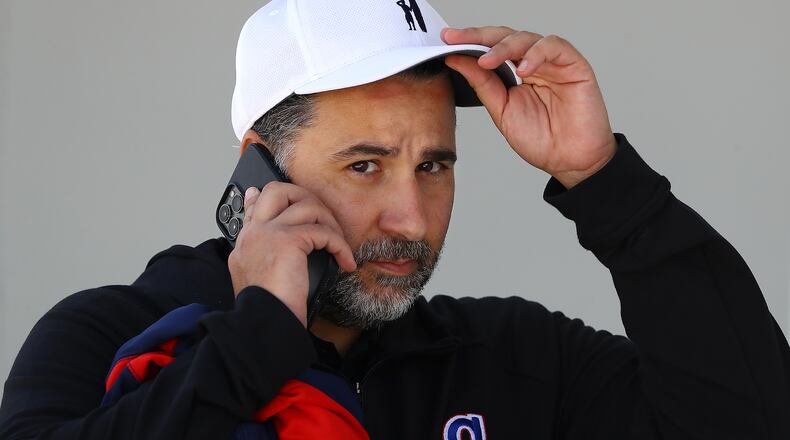When Alex Anthopoulos made trades last summer, the goal was to give the Braves a chance to win a fourth consecutive National League East title and then see what happens in the postseason. The Braves are shoo-ins to play in the postseason this year, so any moves the general manager makes before the Aug. 2 deadline will be about boosting their chances once they get there. There’s still urgency for the Braves, if not desperation.
The Braves have holes to fill. They carry the expectation that they’ll make a serious run at another World Series title. The challenge for Anthopoulos is that their NL rivals are better suited to give trade partners what they tend to want: talented minor league players.
Baseball America updated its top 100 prospect list before the All-Star break. No Braves players made the cut. The Dodgers and Cardinals have seven players on the list. The Padres have five of MLB’s top prospects, the Phillies four and the Mets three. All those contenders are expected to be active at the trade deadline. The Braves will be at a disadvantage if the bidding reaches a point where sellers are demanding top prospects in return.
That’s a good sign for the Braves in the big picture. They built a World Series winner with homegrown players, and Anthopoulos sent top prospects to acquire first baseman Matt Olson before this season. Now the talent cupboard is relatively bare in the minors. Anthopoulos added key players last July without parting with the organization’s best young talent, and now he’ll likely have to do it again.
The Braves do have some good, young players on the big-league roster. But trading outfielder Michael Harris or right-hander Spencer Strider would leave big holes. Anthopoulos is more likely to offload less-touted prospects (there are still some intriguing pitchers on the farm) for veterans who can help. He’s done that kind of deal before, but it could be tougher to pull off this time because of the competition.
Standing pat was a palatable option for the Braves before last weekend. A veteran starting pitcher would help, but it’s not a necessity. Then Adam Duvall suffered a season-ending wrist injury. Now the outfield is the most pressing issue for the Braves, same as last July. Duvall was having one of his worst seasons at the plate, but he’s a solid defender, which makes him more valuable than Marcell Ozuna and Eddie Rosario.
The good news for the Braves is that an outfielder probably won’t cost as much on the trade market as a starting pitcher. The Dodgers, Cardinals, Brewers and Phillies will look for rotation help. The Padres probably are the only other NL contender that has a major need for an outfielder. The Padres and Cardinals are said to be in the running to acquire Nationals superstar Juan Soto, who reportedly turned down a $440 million contract extension.
(As for the Dodgers, they don’t really need Soto. They have superstar Mookie Betts in right field. Then again, the Dodgers didn’t really need a shortstop or starting pitcher at last year’s deadline and went out and got two of the best, Trea Turner and Max Scherzer. It’s good to be the Dodgers.)
It’s unlikely the Braves will join the chase for Soto. That requires a prospect bounty that they don’t have, or multiple good young major leaguers that they’d rather keep. Anthopoulos plausibly can put together an attractive package for two outfielders on the block for rebuilding teams, Ian Happ (Cubs) and Andrew Benintendi (Royals).
Happ, 27, is a switch-hitter and solid left fielder who also can play in the infield. He’s making a lot more consistent contact this season, and that’s the kind of hitter the strikeout-happy Braves need. Happ is making $6.85 million and can expect to make about $10 million in 2023, his final season under contract before reaching free agency. ESPN’s Jeff Passan reports that “everyone wants” Happ, and if that’s the case, the Cubs may find a deal for Happ among the contenders that’s much better than any the Braves can offer.
Benintendi is a more accomplished player than Happ but might be a more realistic target for the Braves because he’s eligible for free agency after this season. Benintendi is a very good left fielder. After three years of so-so production at the plate, he’s hitting .322 with a .390 on-base percentage for the Royals. Benintendi’s salary is $8.5 million.
Ideally, the Braves wouldn’t be looking for an answer in the outfield even with Duvall on the injured list. Rosario is under contract through next season, and the Braves are on the hook to pay Ozuna through 2024. One or the other should be manning left field long term, with Harris in center and Ronald Acuña in right. Rosario and Ozuna aren’t producing now, though, so the Braves need another credible option for left field to make another run at the pennant.
That’s a relatively minor problem for the Braves compared with last July. Then they had more losses than wins and all kinds of issues in the outfield. Acuña was out for the season, Ozuna was on administrative leave per MLB’s domestic violence policy and the Braves had no reliable center fielder. Anthopoulos fixed those issues by trading for four outfielders, including Duvall and Rosario, and we know how that turned out.
The Braves aren’t as desperate before this trade deadline, but they do have needs. Anthopoulos will try to meet them while having fewer good prospects to dangle in deals than his NL rivals.
About the Author


